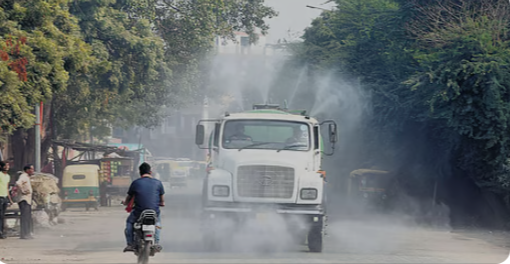The Delhi government is set to introduce micro-level interventions aimed at curbing dust emissions and improving air quality. As part of its ongoing efforts to create a cleaner, healthier urban environment, officials are planning to implement stringent dust control measures at construction sites, regular cleaning of trees, and the deployment of mechanised sweepers to address pollution in narrow lanes and inner roads.
At a recent meeting between Delhi’s Environment Minister, Manjinder Singh Sirsa, and experts from prominent institutions like IIT-Delhi, the Energy and Resources Institute (TERI), and Clean Air Collective, the agenda centered around sustainable urban mobility and effective dust control strategies. The discussion, held at the Delhi Secretariat, highlighted a growing consensus among experts on the urgent need for targeted, data-driven air quality interventions to address the city’s chronic pollution problem. One of the key recommendations was to fast-track the adoption of electric vehicles (EVs) in public transportation. In alignment with the Delhi government’s broader push for electric mobility, experts also advocated for removing old, polluting vehicles from the city’s roads, a move expected to significantly reduce vehicular emissions and improve air quality. The introduction of electric vehicles is seen not only as a way to curb pollution but also as a crucial step towards achieving long-term sustainability goals.
A major focus of the meeting was the expansion of the Delhi Metro network, with officials stating their intent to ensure that every citizen has access to a metro station within 400 meters of their home. This ambitious goal, which aims to strengthen public transport infrastructure, could reduce reliance on private vehicles, thereby addressing both congestion and pollution. Experts also emphasised the importance of micro-level interventions, including dust control measures at construction sites, which they argue contribute to a significant portion of particulate pollution. Construction dust alone accounts for nearly 30% of Delhi’s particulate pollution, making it a major factor in the deteriorating air quality. To tackle this, the Delhi Pollution Control Committee (DPCC) is already working on a dedicated portal to monitor and control dust emissions.
Regular cleaning of trees was also proposed as a method to reduce dust resuspension, with experts suggesting that trees can act as both air purifiers and dust traps. In addition, the implementation of small mechanised road sweepers for cleaning narrow lanes and inner roads is expected to improve cleanliness and reduce airborne particulate matter. Minister Sirsa confirmed that many of the strategies discussed are already part of the government’s ongoing action plans and will be implemented soon. He also expressed concern over the adverse effects of air pollution on children and proposed changes to the school calendar during periods of peak pollution to protect young citizens from its harmful impacts.
The discussion also underscored the need for more advanced air quality monitoring systems and a comprehensive overhaul of the city’s parking policies to ease urban congestion and pollution. The introduction of Automatic Number Plate Recognition (ANPR) systems at Delhi’s border entry points was suggested to help block the entry of unfit and polluting vehicles, further strengthening efforts to reduce emissions from transportation.
In his concluding remarks, Sirsa emphasised the importance of collaboration with scientific institutions, civil society, and citizens to develop real-time, sector-specific action plans that will contribute to the city’s goal of becoming a “Viksit Delhi” (Developed Delhi). “This is not just an environmental issue; it is a moral responsibility to protect our children and ensure clean air for future generations,” Sirsa said. With these new interventions, Delhi is poised to take critical steps towards a cleaner, more sustainable future. The push for stricter dust control and the continued promotion of electric vehicles reflect the government’s commitment to tackling pollution at both the macro and micro levels, ensuring a healthier environment for all residents.
Delhi Government to Tackle Pollution with Dust Control Measures


